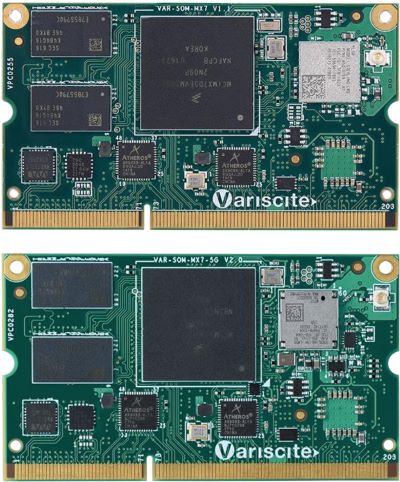NXP i.MX7
( number of products: 3 )System on Module (SoM) solutions based on NXP i.MX 7 processors combine energy efficiency with versatility, making them ideal for applications requiring both efficient processing and low power consumption. They integrate ARM Cortex-A7 and Cortex-M4 cores, enabling real-time task execution with minimal power draw. As a result, they are used in IoT systems, industrial automation, medical devices, and mobile applications. The available development kits simplify prototyping and testing, accelerating time-to-market for products.
NXP i.MX 7 Processors
The i.MX 7 processor family offers:
Heterogeneous core architecture: The combination of energy-efficient ARM Cortex-A7 cores with a Cortex-M4 core enables simultaneous execution of user applications and real-time embedded tasks.
Advanced security features: Support for TrustZone® technology ensures isolation of critical operations and data protection, which is essential for IoT and industrial applications.
Wide range of communication interfaces: Support for protocols such as USB, Ethernet, PCIe, CAN-FD, UART, SPI, and I²C facilitates flexible integration with various peripheral devices.
VAR-SOM-iMX7

System on Module with i.MX 7
SoMs based on i.MX 7 processors are distinguished by:
Low power consumption:
Thanks to advanced energy management mechanisms, these modules are ideal for applications requiring long battery life.
Real-time application support:
The integrated Cortex-M4 core enables the execution of tasks requiring immediate response, which is critical for control and monitoring systems.
Design flexibility:
Compatibility with the VAR-SOM Pin2Pin family allows for easy migration between different Variscite modules, facilitating project scaling and upgrades.
Applications of SoMs with i.MX 7
Due to their unique features, these modules are used in:
Industrial automation:
Implementation of control and monitoring systems with support for industrial protocols and real-time functions.
IoT systems:
Deployment of energy-efficient nodes that collect and process sensor data in smart networks.
Medical devices:
Development of portable diagnostic and monitoring equipment with extended battery life.
Mobile applications:
Development of portable devices requiring low power consumption and real-time task support.

Variscite VAR-SOM-MX7 Starter Kit - evaluation board
- Technology:
- Processor:
- RAM memory:
- eMMC memory:
- Product length in millimeters:
- Product width in millimeters:
- Evaluation boards display:
- Operating system:
- Longevity:

Variscite VAR-SOM-MX7 Evaluation Kit - evaluation board
- Technology:
- Processor:
- RAM memory:
- eMMC memory:
- Product length in millimeters:
- Product width in millimeters:
- Operating system:
- Evaluation boards display:
- Longevity:

Variscite VAR-SOM-MX7 - SoM module
- Technology:
- Processor:
- RAM memory:
- eMMC memory:
- Product length in millimeters:
- Product width in millimeters:
- Operating system:
- Longevity: